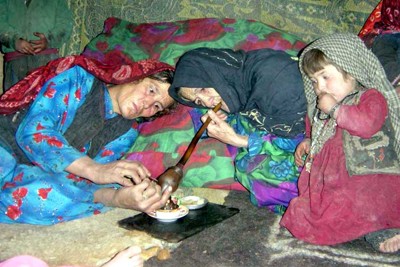Peter Beaumont
Afghanistan, struggling with a huge indigenous drug problem, has a new crisis. Its drug treatment centres - particularly in the capital, Kabul - are being inundated by heroin-addicted former refugees, many forcibly expelled from neighbouring Iran and Pakistan.

Ministry of Counter Narcotics and U.N. Office on Drugs and Crime, found nearly 1 million addicts in this nation of about 30 million people, including 60,000 children under age 15.
The new dimension to Kabul's spiralling problem of opiates abuse is most visible in the war-ruined shell of the city's Russian Cultural Centre, a warren of rubble and faeces-strewn rooms, where each night hundreds of addicts and street children come to sleep.
It is a place of disturbing images. Outside, men play cricket while addicts lie dozing. Inside, users gravitate to the dark places, crawl into disused turbine pipes to smoke heroin from foil or crowd into tiny rooms underground. The youngest and most nimble scale the walls like rock climbers to reach places beneath the roof where they sleep for safety. The most far gone inject their wasted legs and arms in full view of the passing traffic.
Of the dozens approached about how they came to be addicts, only one man was not a returnee from Iran, while the rest had first taken heroin there. The stories were strikingly consistent: they had fled the violence of the civil war or the Taliban era with their families, often being required to work long hours in Iran doing tough jobs.
Many told how unscrupulous employers offered them the drug, telling them it would make their work seem easier - and how in the end they had been rounded up and thrown back across the border, some after brutal treatment in Iranian detention.
At Kabul's Nejat treatment centre a few can qualify for one of the handful of beds after attending a series of awareness workshops. Mohammed Wali, 30, from Bagram, is typical. He was admitted a week before with five others; all say they became addicted in Iran. 'I left Afghanistan during the time of the Taliban,' said Wali. 'I am lucky in that I have a family to support me, although I am ashamed to say that I stole from them. By bad luck I am addicted. When I was working in Iran my employer was giving us opium to make us work harder. For the first 20 days I was given it for free, then I was told that I would have to pay for it. I was spending my earnings on the drug.'
The scale of the problem is revealed by the men's recollections. 'Ten to 12 of us were addicted by the time we returned to our village from Iran,' said Mohammed. Syed, another who was expelled, recalls: 'Six people working in my factory, including two of my brothers and three other villagers, were addicted.'

Tens of thousands of Afghan refugees from Iran and Pakistan are living under disastrous conditions in suburbs of Kabul.
At the cultural centre the addicts smoke scorpion - a mixture of hashish and heroin - or shoot up, often with discarded needles found in the filth. 'I was working in the construction industry and I was walking home when they grabbed me and sent me to the barracks,' said one addict. 'They kept me there three days. Among the 300 people there, 200 I would guess were addicts.'
Others recalled similar numbers of addicts - usually citing between two-thirds and three-quarters of those held in detention.
While many of those expelled complained of insufficient food during their detention, some claimed they were beaten, and showed faint scars on shins and burn marks on wrists and arms. Their claims were impossible to verify.
'We are being swamped,' said Dr Tariq Suliman, director of the Nejat centre, the first Afghan charity to tackle addiction when it was set up 16 years ago. 'We have a waiting list of 1,000 to 2,000 people at any one time. We offer a syringe exchange programme, have a mobile outreach programme, and offer abscess treatment [a consequence of injecting impure heroin into veins].
'The biggest problem now is the returning addicts. It is a tsunami coming to this country,' Suliman said. 'For every addict we estimate that the issue impacts on up to five family members. And 90 per cent of the new addicts that we are seeing are coming from Iran. In the past two years we have just seen the graph rocket. The problem is compounded by the fact that donor agencies will not commit to support our activities in the long term. They will fund a project for a year, but they will not commit to 10 years. And that is the scale of the problem. It is out of control.'
Back at the cultural centre, Ali Raza, an addict thrown out of Iran, is berating a group of boys watching him inject - twice in each arm. He looks 70, but says he is 50. 'We are the worst,' he slurs. 'Don't come here. Don't walk on the way we passed by. Everyone hates us. Don't even take one puff.'



